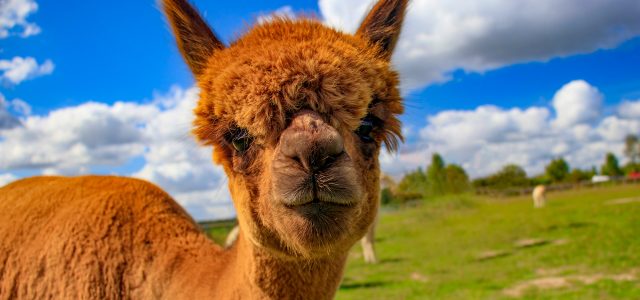
Alpaca Adventure
For a great summertime adventure take time out to visit one of the many alpaca farms in the region, where you can meet and trek with one of these very sociable animals
If you’re seeking some back-to-nature escapism, then you’re in the right location! All you need is a llama or an alpaca, a lovely country trail and you have a memorable experience. Alpacas have stolen the hearts of animal lovers across the country, but it would seem that across Preston and Fylde, we are spoilt for choice!
If you visit any of the local agricultural shows, you will often see herds of alpacas eager to meet visitors. But if you miss them at a show, there are plenty of experiences out there that will give you the chance to not only meet these lovely animals, but trek with them and enjoy their company.
There are meandering walks, meet and greets, therapy sessions and longer treks with these wide-eyed, shaggy camelids – that’s llamas and alpacas to you and me. Also belonging to the camelid family are camels (obviously) along with vicuñas and guancos – wild South American camelids, which live in the high alpine areas of the Andes.
Having been used by humans for transportation and fleece production for thousands of years llamas and alpacas are primarily found in Peru and Bolivia.
The alpaca is thought to be a cross between llamas and vicuñas some 6000 years ago. They have had a turbulent history and were treasured by the ancient Inca civilisation with their fleeces reserved for the Incan royals. Together with their close relative, the llama, alpacas provided clothing, food, fuel and companionship as domesticated animals high in the altiplano of South America.
However, over the last 20 years or so, these animals have adapted well to life on British soil, as they are hardy animals whose forebearers spent thousands of years grazing on pastures in harsh weather conditions.
The most-distinguishing physical differences between alpacas and llamas are their size, their coats and their face shapes. Also, they differ in disposition, which affects the way humans have used them over the years.
The most-noticeable difference between the two animals is their size. Alpacas are smaller than llamas and their faces are also very different – alpacas have small, blunt faces with short ears, while llamas have more-elongated faces with banana-sized ears.
Another difference is their coats. Alpacas have shaggy hair that is used for fleece production. Their hair colour can vary widely, from whites and light yellows to browns and blacks. Llamas’ hair is coarser and their wool is considered inferior, but breeders are working to create a llama breed with finer, softer hair.
So, back to the increasingly popular alpacas here in Preston and Fylde.
The experiences available range from wedding alpacas to alpaca walks, visiting alpaca farms to meeting little ‘crias’ – adorable, long-legged baby alpacas!
One example, based in Lancashire in the rural part of the Fylde coast between Preston and Blackpool, is Singleton Alpacas.
Launched in 2008 Singleton Alpacas started out with two pregnant females and have never looked back. As is the case for many people, owners of alpacas are immediately addicted by their gentle and calming nature, so it wasn’t long before the Singleton’s herd multiplied.
The birthing season is from May to September and the herd is usually kept to around 20. Walking with alpacas is great fun – it is an enjoyable and informative experience. Most of the alpacas are halter trained and visitors get to meet them all including mums and babies – they all have their own personality and are very inquisitive! Visitors get the opportunity to ask questions, feed them and walk with them.
Another example is Lowlands Farm, which began around a decade ago with three female alpacas Islay, Ingot and Karet and this little-herd has grown over the years to almost 40. Visitors enjoy the interaction with the alpacas, the walking experiences and farm activities.
Set in 50 acres of flat grassland between Blackpool and Lytham and five minutes off the M55 at junction 4, the alpaca farm runs alongside a livery yard where the horses and alpacas graze contentedly alongside one another. Included is a meet and greet with a little talk on alpacas and then the chance to take one of them around a beautiful nature walk, with a high chance of seeing hares and buzzards and much more wildlife! There is also a pit stop in the wood to take group photos as the alpacas graze on the grass.
Throughout Lancashire there are many alpaca farms offering alpaca trek experiences and with the summer holidays now here, they are getting increasingly busy.
Do some research, find out which trek or experience you would like and get your tickets booked to ensure a memorable summer!

